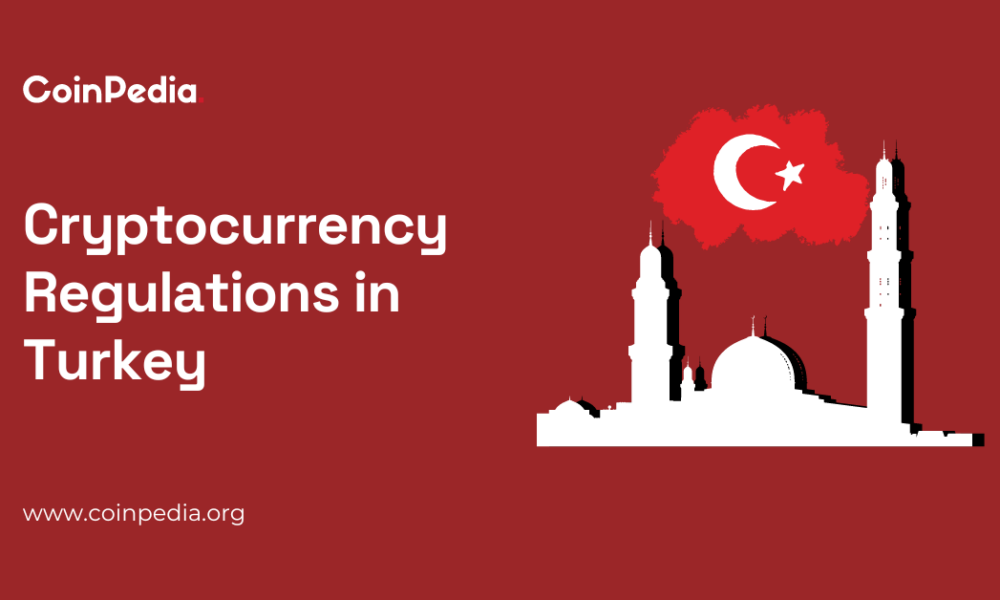Regulation
Crypto Regulations in Türkiye 2024

Turkey emerges as a world leader in cryptocurrency adoption, with over 5 million crypto holders and a remarkable 52% ownership rate among Turkish adults aged 18-60. In May 2023, the country saw an unprecedented surge in the number of crypto enthusiasts. Despite the lack of a legal safety net for investors, Turkey’s fintech sector, particularly cryptocurrencies, has seen substantial growth, culminating in the imminent introduction of groundbreaking legislation to regulate the cryptocurrency space.
In this Coinpedia report, we are about to discuss the latest developments in the Turkish cryptocurrency-related framework. Let’s dive in!
Crypto adoption in Türkiye
The country boasts a robust rate of crypto adoption and Turkish Crypto Regulations has a lot in line with this, with two out of five citizens holding crypto assets. It is mentioned that around 40% of Turks reported investing in crypto, making it one of the most popular asset classes in Turkey. Search by Binance revealed that over the past three years, the crypto adoption rate in Turkey has increased by 24%.
- The percentage growth pushed it to 12th place in the Chainalysis Global Crypto Adoption Index for 2023, surpassing major economies.
- Turkey is the 4th largest market in the world in terms of crypto trading volume.
- During Turkey earthquake relief efforts, Binance airdropped $100 worth of BNB to affected users.
- Crypto exchange OKX entered Turkey as part of a global expansion plan in February 2024.
Crypto Regulations in Türkiye
In 2020, Turkey ranked 14th among crypto investors in the world. The increased interest in crypto in Turkey has prompted many global crypto asset trading platforms to open local operations.
- In 2019, Parliament adopted the 11th Development Plan which provided, among other things, for the implementation of a blockchain-central bank digital currency and the creation of the Association of Payment Services and Electronic Money Institutions.
- In April 2021, the Regulation on Abandonment of Crypto Assets in Payments, i.e. Turkey’s first legislation related to crypto assets, was adopted. The Regulation does not outright ban crypto assets, nor the purchase, sale, offering, transfer or custody of crypto assets and platforms providing services such as crypto exchanges.
- The regulation prohibits the use of crypto assets directly or indirectly in payments, the development of business models by banks or payment institutions, and payment venues and electronic money institutions from acting in intermediary activities for platforms ensuring the purchase, sale, custody, transfer or offering of cryptographic assets.
- Following the amendments made to the anti-money laundering regulation on May 1, 2021, crypto-asset service providers and savings finance companies are considered debtors within the scope of the legislation relating to the prevention of money laundering proceeds of crime and the financing of terrorism.
- These service providers are responsible for compliance with the obligations provided for by the anti-money laundering regulation and other relevant legislation in this area. Obligations include conducting know-your-customer procedures, reporting suspicious transactions, periodic reporting, as well as retaining and submitting information to the Financial Crimes Investigation Board of Turkey.
- The Presidency recently announced that a draft law regarding the detailed regulation of crypto assets and platforms has been submitted to Parliament for consideration and development. Major legislation on crypto assets is expected to be introduced in Turkey in the very near future.
- In a recent interview on January 10, 2024, the Turkish Ministry of Treasury and Finance confirmed that the crypto framework adapted for the Turkish market is close to being completed.
- Turkey’s crypto regulations aim to mitigate the risks associated with trading cryptocurrencies, by protecting ordinary investors and including legal definitions of crucial terms such as “crypto assets”, “crypto wallets” and “ecurrency service providers”. crypto assets.”
- Additionally, it will require crypto platforms to acquire licenses from the Capital Markets Board (CMB) of Turkey.
Overview of legal status
Cryptocurrencies like Bitcoin are legal in Türkiye. However, they retain a complex status here! Although not considered illegal, their use is subject to certain limits established by government authorities such as the Central Bank of the Republic of Turkey.
| Bitcoin | Legal |
| NFT | Legal |
| Mining | Legal |
| Trade | Legal |
| Challenge | Legal |
Crypto Tax Laws
The Ministry of Treasury and Finance is responsible for regulating the taxation of cryptocurrencies in Türkiye. The tax depends on the nature of the transaction and the profits. Here, VAT applies when cryptocurrency is used as a means of payment. If it is held as a capital asset and sold at a profit, the profit is subject to income tax. Non-residents must pay withholding tax on cryptocurrency payments, the rates of which are set by tax treaties. Profits from token sales are taxed based on the profit from the sale. Cryptocurrencies held for a year and sold profitably are taxed as long-term capital gains, at a lower rate. Transactions also comply with AML and KYC regulations, requiring investor identification.
Future prospects and challenges
It is obvious that cryptocurrency and blockchain will become even more popular in the future. An estimated 5.5% of Turkey currently owns digital currency. Turkey’s inflation rate recently exceeded 83%. In addition, wages often do not keep up with inflation, which means that the purchasing power of employees decreases. Many see digital currencies as a refuge from Turkey’s skyrocketing inflation and sharp devaluation of the lira.
They call crypto “savior” in Türkiye! We therefore hope for a better future for cryptocurrencies in the region.
Conclusion
With the daily progress of the crypto sector in Turkey, we hope for a better framework in terms of crypto regulatory environment. 2024 could be a revolutionary year for the crypto scenario in Turkey and we see that it is improving day by day!
